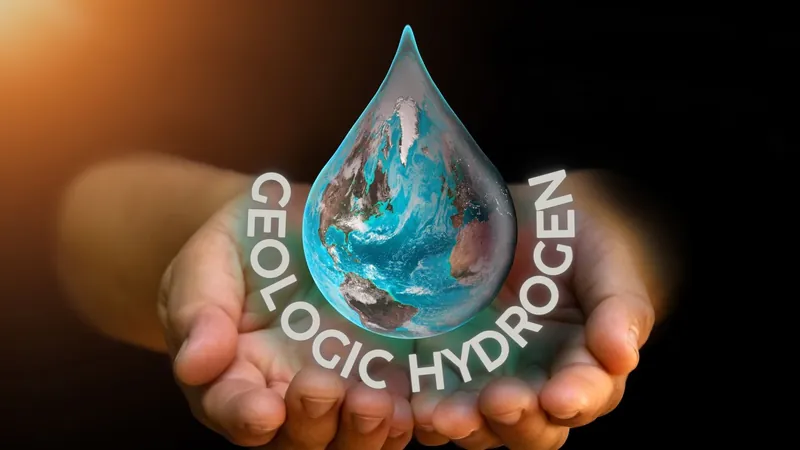
Unlocking the Secrets of Geologic Hydrogen: The $20 Million Venture Transforming Energy Landscape
2024-11-04
Author: Amelia
Digging Deep: The Untapped Potential of Geologic Hydrogen
As the world pushes towards sustainable energy solutions, geologic hydrogen emerges as a groundbreaking contender in the race for cleaner energy. Unlike conventional hydrogen, which is often produced through chemical processes requiring substantial energy input, geologic hydrogen is naturally found below the Earth's surface. This article explores the economic implications, challenges, and transformative potential of this untapped resource in the global energy transition.
The Global Gold Rush
The energy sector is witnessing what some are calling a "new gold rush" surrounding the exploration of geologic hydrogen. Leading the charge, nations like the United States, Canada, Australia, and France are increasingly investing in this promising resource. Recent reports indicate a significant ramp-up in exploration activities aimed at utilizing geologic hydrogen to phase out fossil fuels and curtail carbon emissions dramatically.
In a major endorsement of its potential, the U.S. Department of Energy has earmarked $20 million to fund pioneering research projects focused on subsurface hydrogen generation. This investment reflects a growing consensus among scientists and policymakers that geologic hydrogen could significantly reshape the clean energy landscape, serving as an abundant, zero-emission alternative to traditional fuels.
Economic Implications and Benefits
- **Cost Comparison with Traditional Fuels**: Geologic hydrogen has the potential to be more affordable than conventional hydrogen production methods. Its natural formation translates to minimal processing requirements, which could lead to lower costs compared to hydrogen generated from natural gas or renewable energy sources.
- **Reduction of Greenhouse Gas Emissions**: Utilizing geologic hydrogen has significant environmental benefits. When burned in fuel cells, the only byproducts are water and heat, making it an appealing option for hard-to-decarbonize sectors such as transportation.
- **Impact on Global Energy Markets**: As geologic hydrogen becomes more economically viable, it could disrupt existing energy markets and reduce our dependence on oil and natural gas. This pivot could foster a more diverse and resilient global energy framework.
- **Investment and Research Funding**: With recognition of its potential growing, investments in geologic hydrogen research are increasing from both government and private sectors. Successful exploration and commercialization of this resource could fuel further advancements within the clean energy sector.
Pioneers of the Geologic Hydrogen Revolution
Leading researchers like Mengli Zhang and Yaoguo Li are propelling the exploration of geologic hydrogen to new heights. Supported by the U.S. Geological Survey and industry titans such as BP and Chevron, these geophysicists are adopting advanced exploration methodologies to identify vast underground hydrogen reserves. Their innovative approaches aim to enhance yield and energy generation through both surface and subsurface technologies.
Zhang and Li are at the forefront of a geologic hydrogen consortium, leveraging their expertise in geophysics to develop effective exploration tools. Their collaborative efforts hinge on understanding geologic formations capable of storing hydrogen, with estimates suggesting these reserves could sustainably power humanity for centuries.
Although challenges remain, including hydrogen's rapid absorption underground and the complexity of geological formations, Zhang and Li are leveraging cutting-edge technologies like artificial intelligence to improve models for hydrogen identification and extraction. They emphasize that for geologic hydrogen to compete with oil and gas, continuous innovation will be necessary.
Challenges and Opportunities Ahead
While geologic hydrogen is laden with promise, significant challenges exist. Its volatile nature and the logistical difficulties of extracting it from intricate geological settings are substantial barriers. Yet, these difficulties may also seed groundbreaking technological advancements and novel methodologies in resource extraction.
By combining geophysical expertise with modern technology, the path could transform geologic hydrogen from a hidden treasure into a crucial pillar of our clean energy future.
Conclusion
Geologic hydrogen is positioned as a key player in addressing energy demands and combating climate change. With the potential to reshape global markets and significantly cut greenhouse gas emissions, the ongoing endeavors of experts like Mengli Zhang and Yaoguo Li are vital. As we navigate the complexities of energy transition, geologic hydrogen shines as a beacon of promise for a cleaner, sustainable world. The journey to harness this vital resource, though fraught with challenges, promises potential rewards that can drive the energy sector toward a greener horizon. Don’t miss the unfolding story of this revolutionary energy source!









 Brasil (PT)
Brasil (PT)
 Canada (EN)
Canada (EN)
 Chile (ES)
Chile (ES)
 España (ES)
España (ES)
 France (FR)
France (FR)
 Hong Kong (EN)
Hong Kong (EN)
 Italia (IT)
Italia (IT)
 日本 (JA)
日本 (JA)
 Magyarország (HU)
Magyarország (HU)
 Norge (NO)
Norge (NO)
 Polska (PL)
Polska (PL)
 Schweiz (DE)
Schweiz (DE)
 Singapore (EN)
Singapore (EN)
 Sverige (SV)
Sverige (SV)
 Suomi (FI)
Suomi (FI)
 Türkiye (TR)
Türkiye (TR)